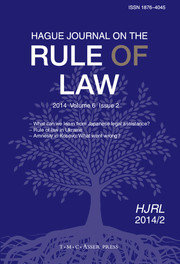Article contents
Japanese Aid in Comparative Perspective
Published online by Cambridge University Press: 10 October 2013
Abstract
Since the 1990s the promotion of rule of law has been one of the main drivers in international legal development. Multilateral and bilateral donors have adopted it as a stand-alone objective and/or included it as a feature of their good governance, economic development, human rights or democracy agendas. While the definitional debates about rule of law abound, to some scholars the ‘degree of apparent international consensus on the value and importance of the rule of law is striking’. Indeed, the rule of law concept has been described as ‘analogous to the notion of the Good in the sense that everyone is for it, but have contrasting convictions about what it is'. Its perceived importance is certainly reflected in the millions of aid dollars spent every year on development activities aimed at establishing the rule of law in developing countries.
Information
- Type
- Articles
- Information
- Copyright
- Copyright © T.M.C. Asser Press and the Authors 2013
- 5
- Cited by

